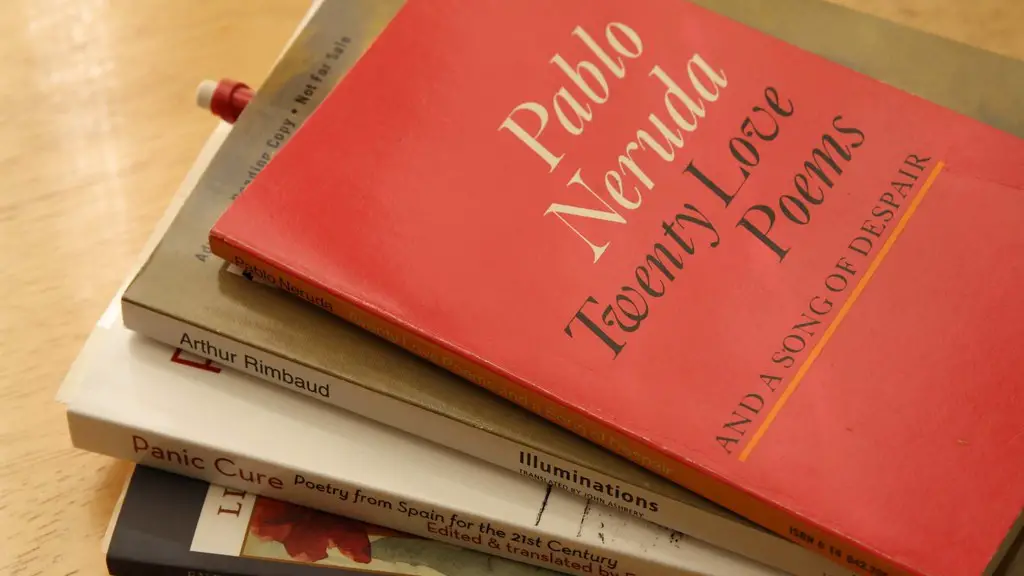Poetry is a form of expression and communication that has been used throughout different cultures and history. It is a combination of words, phrases and sounds to evoke emotions and create a feeling within the reader or listener. One of the main aspects of poetry is the use of register. Register refers to the usage of words and syntax, as well as the tone and voice of the poem.
In many respects, the register of a poem helps to characterize it. Different registers can help to distinguish between serious, formal poetry and lighter, more informal styles. It is a way of recognizing the intent of the poet, the type of audience they are aiming for, and the atmosphere they are trying to create. For example, a poet could choose a more formal, restrained register to communicate their point in a precise and controlled way, or a more lighthearted and humour-filled register to induce laughter from the reader.
When it comes to poetry, register is often used to express how a poet wants an audience to interpret their work. It helps to emphasize important words, movements and ideas through the choice of language. It can also be used to manipulate emotion and tension, by heightening importance or softening the way a message is conveyed. Through the usage of register, a poet can also evoke a certain mood and atmosphere with the tone they use.
Register can even be used to build expectations in the reader. By making use of more formal words and language, a poet can create an expectation of serious content and themes, while through more colloquial words and slang, a reader can have the opposite expectation. This is a way for the poet to ensure that their message and meaning is understood in the way they intended it.
Register can also be used to portray a particular image or idea, as well as information about the poet themselves. The choice of words and language can become part of a distinct writing style, which can then show the personality of the poet. That said, register doesn’t just have to come from the words of the poem – different objects, events, actions, or people can all be used to create the desired register.
In conclusion, understanding the concept of register and how it can be used in a poem is essential for conveying the feeling and emotion of a piece of work. It can be used to evoke a certain atmosphere, enhance the rest of the poem, and even reflect the personality of the poet.
Register in Different Styles of Poetry
Register doesn’t just apply to the written word, but can also be adapted to the different styles of poetry, such as spoken word, rap, and even song. In contrast to written poetry, spoken word relies more on the use of register to control the pace, length and volume of the poem, rather than the style of the words themselves. Similarly, rap also uses register to create emotion and energy in the words being spoken.
Register even plays a role in song, where it has to take a more subtle approach in order to blend in with the structure of the music. It has to be used carefully so as to not detract from the overall sound of the song, yet still contribute to the emotion of the piece. Furthermore, the words of the song should also be chosen for their sound, as the choice of syllables and endings can help to amplify a particular message or feeling.
In this respect, the concept of register can be adapted and applied to many types of poetry, such as spoken word and song. That being said, it’s important to remember that different styles of poetry require different approaches to register in order to effectively convey the emotion or point of the poem.
Why Register is Important in Poetry
One of the main reasons why register is important when it comes to poetry is because it allows the poet to convey their message in the most effective way possible. By choosing the right words and language, a poet can conjure the right atmosphere and evoke a certain emotion in the reader. Through the use of register, a poet can also build tension and expectation, as well as a sense of familiarity between the reader and the poem.
Furthermore, register is also important for helping the reader to understand the point and meaning of the poem. Through the use of appropriate words and language, the poet can ensure that their message is comprehended in the way they intended. This is because each word and phrase can be used to create a particular image or idea in the reader, as well as reinforcing the message and feeling of the poem.
Additionally, register is beneficial to the poem in that it helps to give the piece an identity. By choosing the right words and syntax, the poet can create a distinct writing style that can help to shape the poem’s personality. This can then become an important part of the poem, as it can express the poet’s own thoughts and feelings in a unique and individual way.
In conclusion, register is important in poetry because it helps to ensure that the right emotion is conveyed, that the message is comprehended, and that the poem itself is shaped with its own identity.
Register in Different Cultures
The concept of register also plays a role in poems from different cultures. For example, in Greek poetry, the register tends to be more formal and restrained, with the words and syntax chosen carefully to evoke a certain feeling from the audience. In contrast, in Chinese poetry, the register tends to be more lighthearted and whimsical, with more symbolism and metaphors used to create an atmosphere.
Similarly, in British poetry, the register is often used to express the feelings and emotions of the poet in a more subdued way, using correct grammar and phrasing to convey their message. In American poetry, meanwhile, the register tends to be more relaxed and casual, using language that is modern and colloquial.
Ultimately, the concept of register remains important in poetry from different cultures, as it helps to emphasize certain themes and meanings, evoke a certain atmosphere, and create familiarity between the reader and the poem.
Register Through Literary Devices
Register can also be achieved through the use of various literary devices. Metaphors and similes, for example, are often used to create a comparison between two elements and to drive a point home. Similarly, the use of alliteration, assonance and rhyme can help to create an emphasis on certain words and sounds, which can in turn help to set the tone of the poem.
Furthermore, imagery and symbolism can also be used to evoke a particular image or emotion within the reader. These devices can help to paint a picture of the poem’s meaning and help to enhance the register of the poem. In addition, they can also be used to create a distinct structure and rhythm, as well as adding fluency to the words.
In conclusion, the use of literary devices can be an effective way of achieving the desired register in a poem. Through the use of metaphors, symbols, and other literary tools, a poet can evoke the right emotion, create an atmosphere, and emphasize certain themes and messages.
Register Within Rhyme and Verse
The concept of register can even be applied to the structures of a poem. Many poets use different forms of rhyme and metre to help to convey the content and emotion of their work. By carefully choosing syllables and words, they can make use of patterns and structures to help to reinforce the meaning of the poem.
In the same way, poets can also adapt the length and form of their poem in order to set the right tone and atmosphere. Through the choice of shorter or longer verses, or syllables of varying lengths, the poet can achieve a certain consistency and rhythm that can help to accentuate their message.
In conclusion, the use of rhyme and metre can be another way of achieving the desired register in a poem. By making use of patterns, structures and lengths, a poet can create the right atmosphere and convey their message in a precise and effective way.





